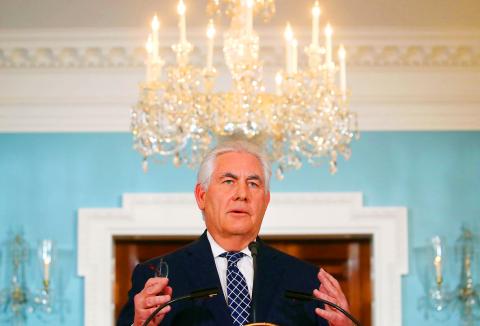US Secretary of State Rex Tillerson tore into a 2015 nuclear deal with Iran, saying it only delayed the nation’s ambition to gain weapons of mass destruction, and did not take into account its role in sponsoring terrorism and destabilizing other nations.
“This deal represents the same failed approach of the past,” Tillerson said on Wednesday at a hastily arranged news conference in Washington.
The tough talk followed the most tangible step taken by Tillerson on Iran: certifying to the US Congress late on Tuesday that the Islamic Republic is complying with the terms of the nuclear deal, a finding required by law every 90 days.

Photo: AFP
Tillerson’s announcement was the strongest signal to date that US President Donald Trump might walk away from the nuclear deal.
Trump this week ordered his National Security Council to review whether to reimpose sanctions that were eased under the accord because of Iran’s continued support of terrorism.
Tillerson said in his statement that the review would determine whether the suspension of sanctions “is vital to the national security interests of the United States.”
“Worn-out US accusations can’t mask its admission of Iran’s compliance” with the nuclear agreement, which is forcing the US administration “to change course and fulfill its own commitments,” Iranian Minister of Foreign Affairs Javad Zarif yesterday said on his Twitter account.
Trump has panned what he has called “the horrible Iran deal” reached by the US and five other world powers under his predecessor, former US president Barack Obama.
During last year’s presidential campaign, he called for dismantling or renegotiating it.
Republicans in the US Congress have also been critical, advocating new sanctions on Iran for supporting terrorism and for its ballistic missile program.
Under the international agreement, Iran is allowed to enrich and store some uranium for energy production, although it had to reduce its uranium stockpile by 96 percent, idle many of its enrichment centrifuges and pour concrete into its heavy-water nuclear reactor.
The Obama administration insisted the provisions would slow the time it would take Iran to produce nuclear weapons.
Opponents of the agreement have called for renegotiating the accord with the goal of making permanent its 15-year moratorium on uranium enrichment close to the level needed to make a bomb, but reimposing sanctions that were explicitly tied to Iran’s nuclear program — as Tillerson suggested in his announcement — would face particular opposition from the US’ European allies and give the government in Tehran grounds to walk away from the accord.
“The deal is working and there’s absolutely no reason to pull away from it,” Barbara Slavin, acting director at the Future of Iran Initiative at the Atlantic Council in Washington, said in an interview on Wednesday. “The US would be isolated from the rest of the world. Iran is abiding by it.”
She said the review was a fig leaf to cover a decision by the Trump administration to abide by the Iran accord, if grudgingly.
“Every administration, when it doesn’t know what the hell to do, reviews things,” Slavin said.

A Ministry of Foreign Affairs official yesterday said that a delegation that visited China for an APEC meeting did not receive any kind of treatment that downgraded Taiwan’s sovereignty. Department of International Organizations Director-General Jonathan Sun (孫儉元) said that he and a group of ministry officials visited Shenzhen, China, to attend the APEC Informal Senior Officials’ Meeting last month. The trip went “smoothly and safely” for all Taiwanese delegates, as the Chinese side arranged the trip in accordance with long-standing practices, Sun said at the ministry’s weekly briefing. The Taiwanese group did not encounter any political suppression, he said. Sun made the remarks when

The Taiwanese passport ranked 33rd in a global listing of passports by convenience this month, rising three places from last month’s ranking, but matching its position in January last year. The Henley Passport Index, an international ranking of passports by the number of designations its holder can travel to without a visa, showed that the Taiwan passport enables holders to travel to 139 countries and territories without a visa. Singapore’s passport was ranked the most powerful with visa-free access to 192 destinations out of 227, according to the index published on Tuesday by UK-based migration investment consultancy firm Henley and Partners. Japan’s and

BROAD AGREEMENT: The two are nearing a trade deal to reduce Taiwan’s tariff to 15% and a commitment for TSMC to build five more fabs, a ‘New York Times’ report said Taiwan and the US have reached a broad consensus on a trade deal, the Executive Yuan’s Office of Trade Negotiations said yesterday, after a report said that Washington is set to reduce Taiwan’s tariff rate to 15 percent. The New York Times on Monday reported that the two nations are nearing a trade deal to reduce Taiwan’s tariff rate to 15 percent and commit Taiwan Semiconductor Manufacturing Co (TSMC, 台積電) to building at least five more facilities in the US. “The agreement, which has been under negotiation for months, is being legally scrubbed and could be announced this month,” the paper said,

MIXED SOURCING: While Taiwan is expanding domestic production, it also sources munitions overseas, as some, like M855 rounds, are cheaper than locally made ones Taiwan and the US plan to jointly produce 155mm artillery shells, as the munition is in high demand due to the Ukraine-Russia war and should be useful in Taiwan’s self-defense, Armaments Bureau Director-General Lieutenant General Lin Wen-hsiang (林文祥) told lawmakers in Taipei yesterday. Lin was responding to questions about Taiwan’s partnership with allies in producing munitions at a meeting of the legislature’s Foreign Affairs and National Defense Committee. Given the intense demand for 155mm artillery shells in Ukraine’s defense against the Russian invasion, and in light of Taiwan’s own defensive needs, Taipei and Washington plan to jointly produce 155mm shells, said Lin,